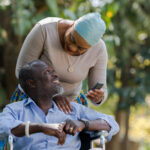
Signs Your Elderly Loved One May Need Extra Care
April 15, 2025
Caring for Aging Parents in Ghana: What Families Need to Know
September 19, 2025Healthy aging is not only about medical care—it’s also about daily habits that promote strength, energy, and wellbeing. For Ghana’s elderly population, nutrition and lifestyle choices play a vital role in maintaining independence and preventing chronic illnesses. With a few simple but meaningful adjustments, older adults can enjoy a higher quality of life and remain active members of their families and communities.

Simple, Culturally Relevant Dietary Advice
A balanced diet is essential for aging gracefully, but it does not have to be complicated. Traditional Ghanaian foods already provide many of the nutrients elders need. Staples like kontomire (cocoyam leaves), beans, garden eggs, and fish are rich in vitamins, protein, and fiber. These should be paired with controlled portions of carbohydrate-heavy meals such as fufu, banku, or kenkey to avoid excess calorie intake.
It is also important to limit overly processed foods, high-salt seasonings, and excessive oil, which can contribute to hypertension and heart disease. Families can encourage elders to eat smaller, more frequent meals to support digestion and maintain energy throughout the day. With mindful preparation, Ghanaian cuisine can be both delicious and supportive of healthy aging.
Hydration, Exercise, and Wellness Add-ons
As people age, the body’s natural sense of thirst decreases, making dehydration a common but often overlooked problem. Encouraging elders to drink water regularly—even if they don’t feel thirsty—is essential. Herbal teas and light soups can also help maintain hydration while providing comfort and nutrients.
Light physical activity is equally important. Simple walks around the compound, stretching, or gentle aerobics improve mobility, strengthen muscles, and reduce the risk of falls. For those unable to engage in physical exercise, activities such as reading, storytelling, or memory games provide mental stimulation and emotional wellbeing. These “wellness add-ons” enrich the daily lives of elders while supporting both body and mind.
Nutrition & Chronic Illness Prevention
The link between diet and chronic illness becomes even more critical with age. Conditions like diabetes, hypertension, and arthritis are strongly influenced by daily nutrition. Reducing salt intake, avoiding excess sugar, and choosing healthier oils (such as groundnut or palm oil in moderation) can significantly reduce risks.
In addition, nutrient-rich foods like fruits, vegetables, and legumes help strengthen the immune system and improve recovery from illness. Families should view meals not just as sustenance, but as medicine—an opportunity to prevent health complications before they arise. By making thoughtful dietary choices, elders can live longer, healthier lives with fewer medical interventions.



